analysis Asia
What’s next for Indonesia after Prabowo’s Gaza peace summit trip?
A “hot mic” moment, rapport with fellow heads of state, and false reports of a visit to Israel. Indonesia President Prabowo Subianto’s Gaza peace summit trip shows the opportunities and potential pitfalls of his brand of diplomacy, experts say.
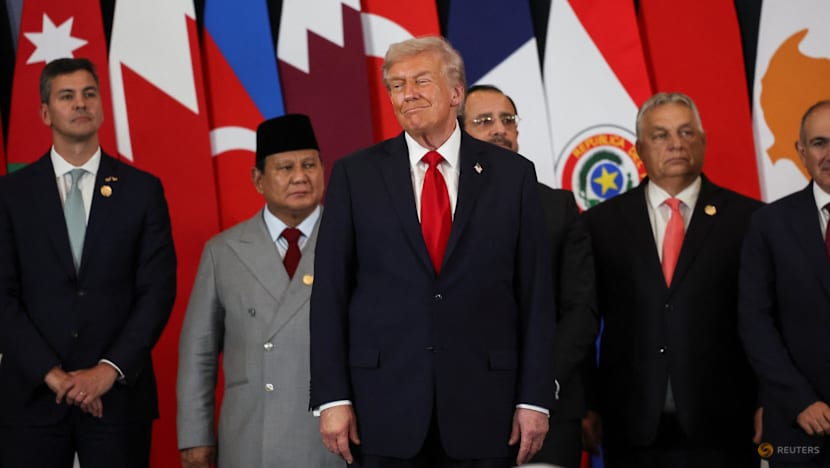

This audio is generated by an AI tool.
JAKARTA/SINGAPORE: President Prabowo Subianto’s participation in the Gaza peace summit in Egypt affirms Indonesia’s elevated international profile and highlights the opportunities and potential pitfalls in his brand of diplomacy, analysts said.
As the only Southeast Asian leader among more than 20 at Monday's (Oct 13) summit, Prabowo found himself in the global spotlight when United States President Donald Trump called each leader and dignitary on stage in his speech that was broadcast “live”.
Describing Prabowo as “a very incredible man of Indonesia”, Trump approached Prabowo, shook his hand, and said, “President, come here. Great job.”
While experts are divided on whether Prabowo’s presence in Egypt was merely symbolic, they said he demonstrated rapport with fellow heads of state and that Indonesia could use its growing global influence to aid the process towards peace in Gaza.
Prabowo could also maintain communication with Trump in order to share Indonesia’s perspectives on the ceasefire’s implementation, they add.
But apart from the opportunities arising from Indonesia’s global standing, a “hot mic” moment between him and Trump, and false reports of a visit to Israel show the potential pitfalls of Prabowo’s brand of diplomacy, experts noted.
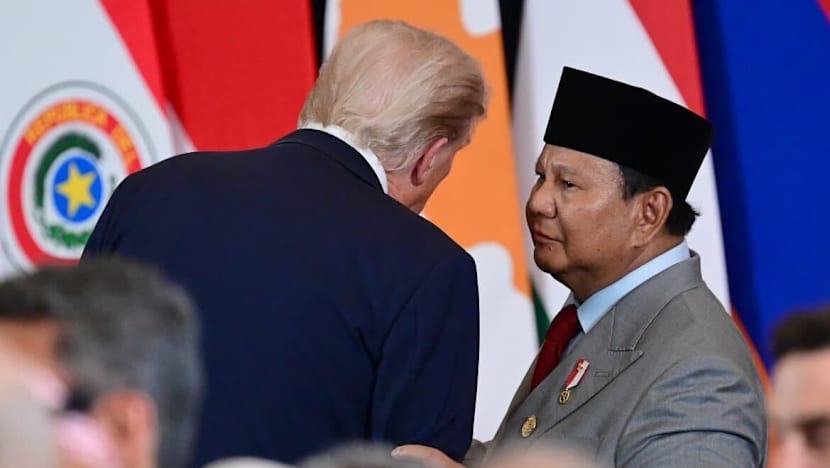
RISING STATURE AND INFLUENCE
Prabowo’s presence at the Gaza peace summit is the latest sign of Indonesia’s stronger global standing under his leadership, according to some analysts.
Within a year of taking office on Oct 20 last year, he has made 36 official visits to 24 countries. In comparison, his predecessor Joko “Jokowi” Widodo made 58 state visits to 41 countries during his 10 years in power.
Last month, Prabowo’s address at the United Nations General Assembly in New York marked the first by an Indonesian president in a decade – Jokowi had consistently skipped the UN General Assembly, delegating the task to then-Foreign Minister Retno Marsudi.
In his speech, Prabowo offered to send at least 20,000 troops as peacekeepers to Gaza and expressed “complete support” for a two-state solution, which he said was key for real peace. Indonesia recognised the Palestinian state in 1988.
Prabowo also made a solidarity visit to Qatar on Sep 12, following an Israeli airstrike that targeted leaders of Palestinian militant group Hamas in Doha, which was followed by a working visit to the United Arab Emirates (UAE).
“A country’s stature and influence on the global stage largely depends on the role of its president,” said Yon Machmudi, an expert in Middle East history and geopolitics at the University of Indonesia.
“If a president is active in building communication and attending various international forums, the country will be seen as stronger and more positive in the eyes of the world. Conversely, if a leader focuses only on domestic issues, the nation’s relations and influence internationally will naturally weaken,” said Yon.
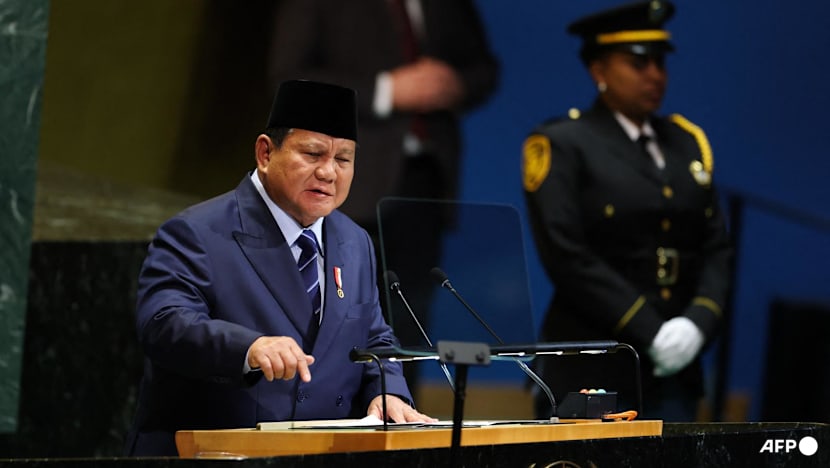
In Southeast Asia, current Association of Southeast Asian Nations (ASEAN) chair Malaysia has also been vocal in calling for peace in Gaza, but was not invited to the summit in Egypt.
Prime Minister Anwar Ibrahim said Malaysia was not invited because it did not offer full and unconditional support for the US-initiated 20-point peace plan.
Anwar reaffirmed that Malaysia maintains a conditional stance on the issue, emphasising any peace initiative must provide a comprehensive solution that recognises Palestine as a sovereign state and guarantees the right of return for displaced Palestinians.
“We are among the few countries that gave conditional support. Most of the countries, including those present in Sharm El-Sheikh, expressed full support,” he told the House of Representatives on Oct 14.
There are two key factors that set Indonesia apart from Malaysia in this matter, according to Akbar Kurnia Putra, an international relations expert from Jambi University.
First, Indonesia is now regarded as a middle power with significant influence — it has the world’s largest Muslim population, is a member of the G20, and has maintained a long and consistent commitment to Palestinian independence.
Second, Indonesia has taken an active stance by introducing initiatives for a UN ceasefire resolution and pushing for humanitarian access to Gaza.
“Indonesia is no longer seen as a mere bystander, but as part of the solution. This means Indonesia’s presence lends global legitimacy to the idea that Southeast Asia has a moderate leader,” Akbar said.
Agreeing, Teuku Rezasyah, an international relations lecturer at Padjadjaran University, said: “Indonesia’s position is no longer limited to the ASEAN level — it is now a qualified middle power, a capable mid-tier nation engaged in broad cooperation with many others.”
Prabowo’s multiple official visits since taking office demonstrate “tremendous energy”, said Teuku.
“Prabowo can depart at night and be back within 24 hours,” he said. “When the media are still reporting on his overseas trips and people are talking about them, he’s already back home.”
Some experts are, however, sceptical of the impact of Prabowo’s attendance at the summit, seeing his presence as largely symbolic and a diplomatic showcase.
Indonesia was not deeply involved in ceasefire negotiations, unlike Egypt, Qatar or Turkiye, which co-signed a declaration as guarantors of the ceasefire deal aimed at ending two years of war in Gaza, noted Yohanes Sulaiman, associate professor in international relations at Universitas Jenderal Achmad Yani.
“I believe Trump and the US wanted to invite Prabowo as a prop, to lend additional support to Trump’s ceasefire and Gaza deal,” he said. “I think his invitation was purely pragmatic, not an indication that Prabowo played a central role in the process.”
Prabowo’s presence in Egypt lent legitimacy to the US and its allies, as if they had the backing of the Islamic world, said Suzie Sudarman of the University of Indonesia’s International Relations Studies Department.
Trump’s praise of Prabowo reflects a recurring pattern in US relations with Muslim-majority countries, Suzie said, pointing to the 2003 Iraq War when then President George W Bush met his Indonesian counterpart Megawati Soekarnoputri in Bali and stated, “Indonesia is a vital partner, and Indonesia is a friend of America”.
“Looking at history, this pattern repeats itself. What (the US) really needs is a ‘mask’ — a symbol suggesting that Muslim countries can be made to align with the interests of Israel or its allies,” Suzie said.
RAPPORT AND THE “HOT MIC” MOMENT
Back home, Prabowo’s attendance at the Gaza peace summit has drawn positive reactions from Indonesians, going by the wave of supportive comments to his Instagram posts.
Experts agreed the president demonstrated his communication skills and rapport with other heads of state, but cited elements of his trip that were potential pitfalls.
On a live microphone, Prabowo was heard casually saying to Trump that he wanted to meet the latter’s son Eric, though the context of the remark remains unclear. Eric Trump is an executive vice president of the Trump Organization, which has business operations involving real estate, hospitality and blockchain-based ventures.
Indonesian conglomerate MNC Group's property unit MNC Land, now called MNC Tourism, operates an integrated resort in partnership with the Trump Organization about 60 km south of Jakarta.
Both leaders appeared to be unaware that a live microphone was recording their conversation.
Indonesia’s Foreign Minister Sugiono later told reporters he did not know the content of Prabowo’s conversation with Trump, adding that it was nothing unusual since the two are “friends.”
The hot mic incident has the potential for backlash at home, analysts said.
The perception may arise that Prabowo used the event in Egypt to discuss business matters, or possibly extend special treatment to Eric, which could create a conflict of interest, said Akbar from Jambi University.
“Such issues tend to be exploited by political rivals to create negative narratives linking power with business interests,” Akbar said.
Teuku felt Prabowo’s conversation with Trump would not be a problem as long as state affairs remain governed by strict legal boundaries and business affairs are governed by transparent processes.
“For example, through a transparent tender process, allowing companies to compete fairly for major projects between the two countries,” Teuku explained.
Prabowo’s Gaza summit attendance also stirred concern amid rumours online and in Israeli media that he would visit Israel after Egypt. His Gerindra Party called the media reports a “hoax”, while Foreign Minister Sugiono said the rumours were not true.
Some experts viewed it as part of a disinformation campaign that Teuku said was aimed at putting Prabowo in a “difficult position”.
Indonesia does not have diplomatic relations with Israel and Prabowo’s “reputation at home could be ruined if he were to visit Israel”, Teuku said.
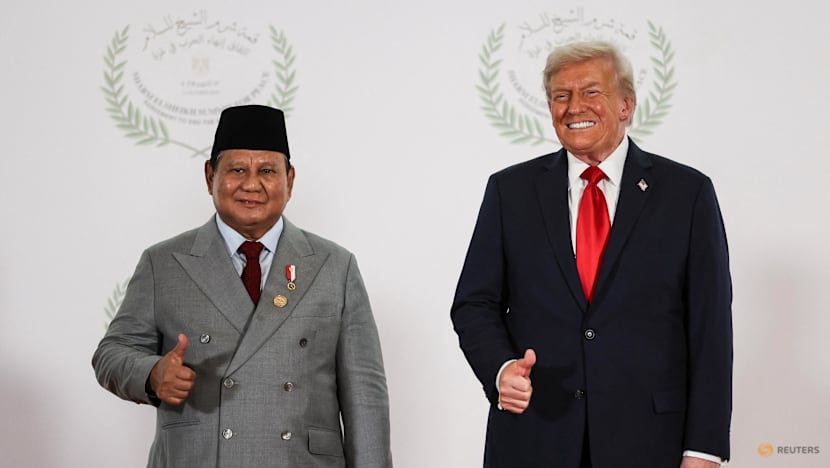
Prabowo’s tendency to attend global events himself may also be a double-edged sword when it comes to perceptions, experts noted.
It could reflect a kind of diplomacy “driven by a fear of missing out — a tendency to react to global developments rather than proactively shape them”, said Radityo Dharmaputra, an international relations lecturer at Airlangga University in Surabaya.
But his presence lends an air of moderation to events, Teuku argued.
“Whenever Indonesia is represented, any organisation tends to appear more moderate. Indonesia won’t issue confrontational statements,” Teuku said, citing Indonesia’s entry into BRICS in January.
Indonesia’s non-aligned policy lets it balance trade and security ties globally, making BRICS – a bloc consisting of countries from the Global South that is seen as a counterweight to the West – seem less confrontational and more compromise-driven, Akbar said.
“Within BRICS, there are voices calling for direct confrontation with its rivals, but in reality, Indonesia now acts as the balancing force between the two sides. Indonesia’s approach tends to be more cooperative, seeking common ground rather than conflict,” Akbar said.
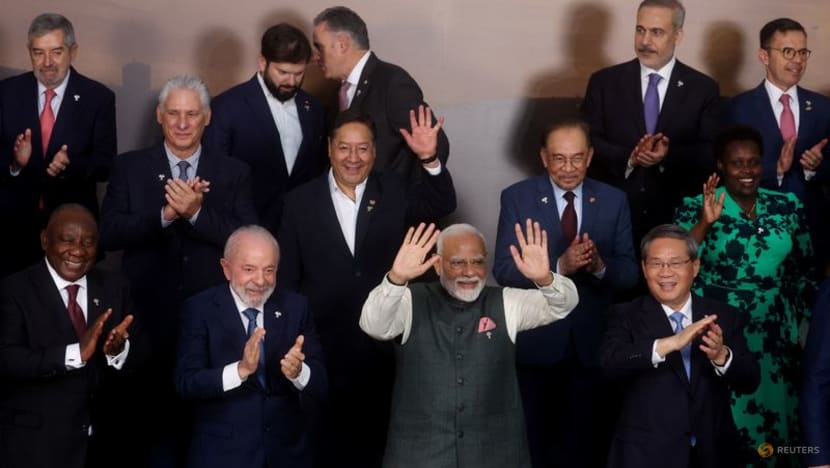
WHAT NEXT?
Following the summit in Egypt, Prabowo must take concrete follow-up actions if he does not want his visit to be seen as merely symbolic, said Radityo from Airlangga University.
“Continued involvement would strengthen Indonesia’s — and Prabowo’s — credibility, while the alternative ... would weaken Indonesia’s position,” Radityo said.
Suzie said Indonesia’s rising stature as a voice for Muslim-majority nations gives Prabowo the leverage to ensure his country stays involved in efforts to aid Palestinians.
“Prabowo must assert that this ceasefire process should be monitored and guided by Indonesia,” Suzie said.
Before he left for Egypt, Prabowo had instructed the Indonesian Armed Forces to prepare peacekeeping forces to be deployed to Gaza.
Prabowo could push for Indonesia’s inclusion in Trump’s “Board of Peace” by lobbying the countries that brokered the ceasefire, said Yon, referring to a proposal in the 20-point peace plan to oversee Gaza’s transitional governance. Its members have yet to be announced.
“Indonesia’s participation in the Board of Peace would help ensure that the ceasefire becomes permanent,” Yon said.
“Maintaining communication with President Donald Trump is essential for Indonesia to share its perspectives on the implementation of the ceasefire, especially if obstacles emerge."





















